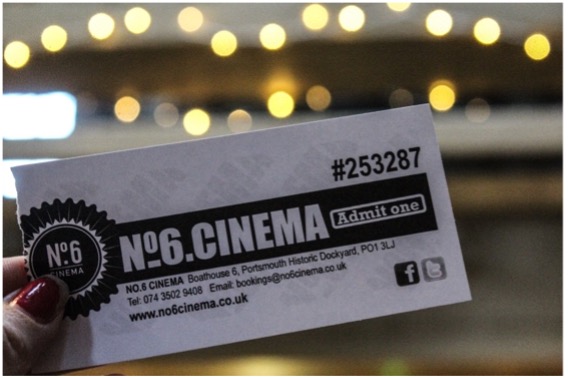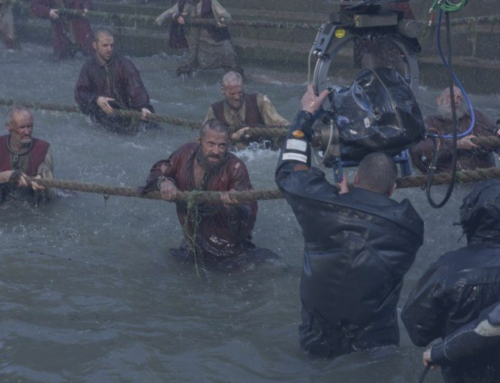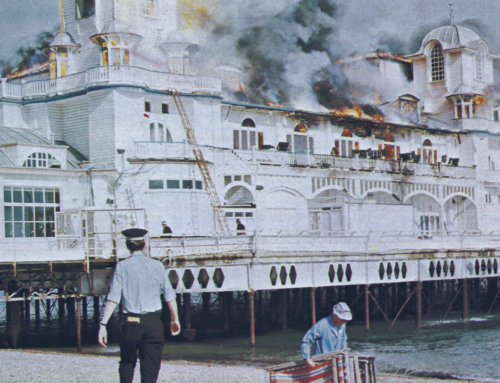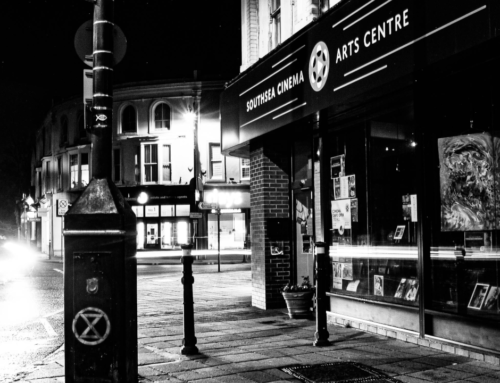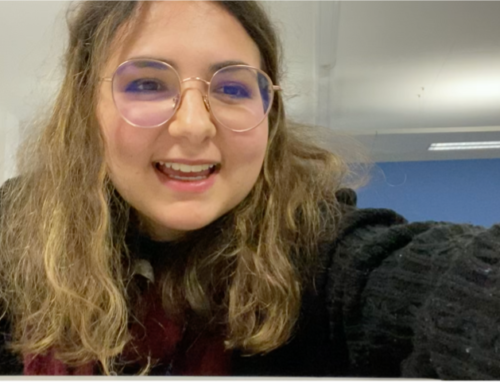Isn’t it amazing how our city has managed to assist an army of people in developing their creative talents? Meet two such people who, despite being at different stages of their artistic journey, have both found the place to develop their creativity through cinema in Portsmouth and maybe we can determine what it is that allows artists to blossom how they do here.
Whether it’s the Charles Dickens statue you see on your strolls past Guildhall Square every day or one of the countless colourful murals that lately continue to reveal themselves on our tall brick walls, the city begs to brag about the creative minds it hosts.
Kearin Green, first year film student at the University of Portsmouth and one such creative mind, admits that when people initially think of Portsmouth, they most likely do not automatically assume that it holds a significant culture of creativity, overlooking it in favour of more advertised hubs such as Brighton. However, this is not an opinion that she, herself, shares.
She says, in reality, especially with university students, there is creativity everywhere. Always students filming projects or doing something “really ground-breaking” or taking photos in the park.
“I think it’s actually a very colourful place if you look at it” she says.
“It just makes you want to be creative”
Malisa Chafer, currently volunteering as chairwoman at the only independent cinema in the city, No6 Cinema, agrees. With opportunities for young creatives including events such as Making Waves Film Festival and cheap living expenses, especially compared to Brighton, artists flock to this city to keep up their creative practices.
As Hotwalls says: “Portsmouth has a thriving creative sector and affordable workspace is in great demand.”
Chafer, well-versed as she is with the creative capabilities in Portsmouth, was not lost for areas where artists and creatives can go to get inspired.
Although, as Chafer says, artists are largely self-motivated, working independently or naturally finding those of similar mindsets to work with. People who are like minded attract each other and inevitably you support each other in the creative outlets they are pursuing.
There are multiple places in Portsmouth which cultivate and support these creatives. It is not the city of Portsmouth that creates the art, but it is the nature of this city that is able to draw incredible artists, whether it be street artists, painters, or photographers, to work in this space.
Aspex describe themselves as a place that exists solely to support emerging artists in the early stages of their careers, reveal the creative process, and engage new audiences with visual art. They say their aim is to “make the creation and enjoyment of art a more inclusive activity.”
Art space advertise as a creative hub of support for visual art and artists professional development. The organisation occupies a unique place in “the local creative industries community” and is driven by its artist membership.
Hotwalls says they work to bring artists and designer-makers together to start and grow their creative ventures in “an environment of mutual support, creativity and innovation.”
The Maker’s Guild Initiative has also worked since 2017 to set up spaces where members of the public can come to pursue various creative outlets.
They say: “there is always something interesting happening”
Victorious Festival is also instrumental in bringing craft fair to Portsmouth. Chafer suggests they need to publicise these opportunities that are out there. We are in an exciting time now as they wait to appoint a CEO. Making it possible to bring people together more with a more cohesive plan.
One of the biggest thing which makes Portsmouth a great place to develop creativity, no matter how deeply buried, is simply experiencing it, feeling that artistic history around you as you work. Malisa Chafer did just this. She says you have got to look at the dockyard as having a massive influence on Portsmouth.
After the university has gradually taken over, the dockyard has gotten a lot smaller, but it certainly had a massive influence on the type of people coming into Portsmouth – the working class. For a while this city’s culture has favoured football, leading to a lack of support for arts but hings are evolving and changing in an exciting way and the university has had a massive influence on this.
The University of Portsmouth is one of the main points bringing people into our little hub of creativity. It has long been a place where artists can develop work in the arts, glass, fine art, fashion, textiles, architecture, and filmmaking. Sometimes where the university doesn’t fulfil the role somewhere else will step up to fill that gap – Making Waves Film Festival to the rescue!
Chafer suggests where there is not so much history of cinema in Portsmouth, it is being created now. She says this pressure plays on her mind a lot. Having a small amount of people commit a lot of time means something you love might no longer exist. She describes a feeling of disappointment as what is largely needed in situations like these is young blood and new ideas. Walking away and leaving it in safe hands is a worry. So why develop your creative cinephile side in Portsmouth? Because we need you. As Chafer says, there are people who love cinema and wouldn’t want to see it decline following the pandemic.
Malisa Chafer has always been a creative person and knew she wanted to get involved with something in the city when she moved here. Although film was not necessarily an area of expertise, it was a long-held passion and an art form of great admiration so when she “fell into No6 Cinema” it was a perfect fit for developing her artistic cinephile side.
Similarly, Kearin Green says film was instilled in her early on in life. She says in a truly affirming moment she just knew. It felt like something she simply had to do. Seeing herself as a storyteller day to day, she loved the idea of linking stories from the film playing in her mind with the visual side. Film felt like the perfect medium for Kearin to study. Telling stories, using cameras, using special effects and making a life of what Green calls one of her “greatest enjoyments in life”: watching films.
“People I met who advocated for Portsmouth made It sound like I was going to have the time of my life”, says Green.
To Kearin, the combination of the experience, the film school and industry links made her decision for her. She was particularly impressed with the way the lecturers promised to teach you how to be a filmmaker. Kearin puts it best herself when she tells me she wanted to do something as real as that. In this, her third year of study, she has already experienced some change in her perspective on film.
“I feel very natural when I’m directing” says Green.
“I’m surrounded by a lot of creative people and there’s a lot of resources.”
By Louisa Clarke


